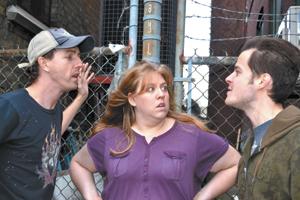It was the type of ambush television that delighted afternoon audiences, with delicious tales of incest, betrayal and every fucked-up kind of family one could imagine. Yes, the Jenny Jones talk show cheerfully slung out the swill every weekday from 1991 to 2003, and millions lapped it up.
One popular recurring segment for Jenny and the gang was called Secret Crushes, where hapless individuals were shepherded onto the stage, oblivious to who might be waiting behind the curtain with cheap roses and a goofy smile to declare their undying love.
This was especially funny because, aside from the rare “Aw, they’re so cute together” moments, the smitten party was more often someone the unaware crush would never be seen with: they were either ugly, overweight, nerdy or all three.
Or gay.
Because what could be more hilarious and embarrassing than finding out the person madly in love with you is a member of the same sex? Well, in 1995 we found out it wasn’t really that hilarious when Jonathan Schmitz shot Scott Amedure twice in the chest following a taping of the show on which Amedure confessed his love for his best friend Schmitz.
Needless to say, the show never aired. But the ensuing trial and flurry of media coverage confirmed that for some people, even being suspected of homosexual behaviour is worse than spending life behind bars.
Playwright, actor and director Hume Baugh was captivated by the tragedy from the moment he first heard about it and found himself empathizing with both parties.
“One of my first reactions was how terrible it was to ambush someone on TV like that,” says Baugh. “That was such a homophobic thing in itself, basically saying that being gay is so bad that if you had a secret crush on another man it would be fodder for laughter. I guess I can identify with the humiliation thing.”
It’s a thoughtful perspective on the murder and the larger spectre of gay-hating that infected (and still infects) society and media. It’s also the premise for Baugh’s excellent play Crush, a favourite from the 2008 SummerWorks Theatre Festival now playing at the Factory Studio Theatre.
Crush brings back elements of what unfolded on the Jenny Jones episode but focuses more on a fictionalized account of the relationships between the gay man, his killer and a female best friend who witnessed it all.
Ronnie (played by Ryan Kelly) is a troubled guy. He drinks too much, has no direction in life and sleeps with a lot of questionable men. Ronnie works part time in a bar, but there isn’t much to do in the trailer park where he lives, so he and his friend Sandra (Courtney Lyons) while away their evenings boozing it up and fantasizing about their new neighbour Martin (Julian DeZotti).
The object of their affections is a real hunk of a man who is still reeling after being dumped by his last girlfriend. Martin joins Ronnie and Sandra’s drinking sessions, which soon leads to too much disclosure, uneasy attractions and, eventually, tragedy.
It’s an environment Baugh found familiar, having also grown up in a small town.
“I lived in Orillia, the lowest-income city in Ontario at the time,” he says. “I grew up in a culture very much like what is depicted in the play . . . lots of drinking, nothing to do but hang out, and a lot of homophobia.
“These are people who don’t have a lot of options in life. They’re working dead-end jobs but don’t have enough education to get out.”
And while he deplores the violence of the Jenny Jones guests and his own creations, Baugh feels driven to understand the culture of violence and bigotry that feeds perpetrators of gay hate crimes.
“Of course I identify with Ronnie, but I also wondered what makes someone like Martin do what he did. I can’t help but be really interested in those people, and in people whose lives are circumscribed, and striving for difficulty in very difficult circumstances.”

 Why you can trust Xtra
Why you can trust Xtra


